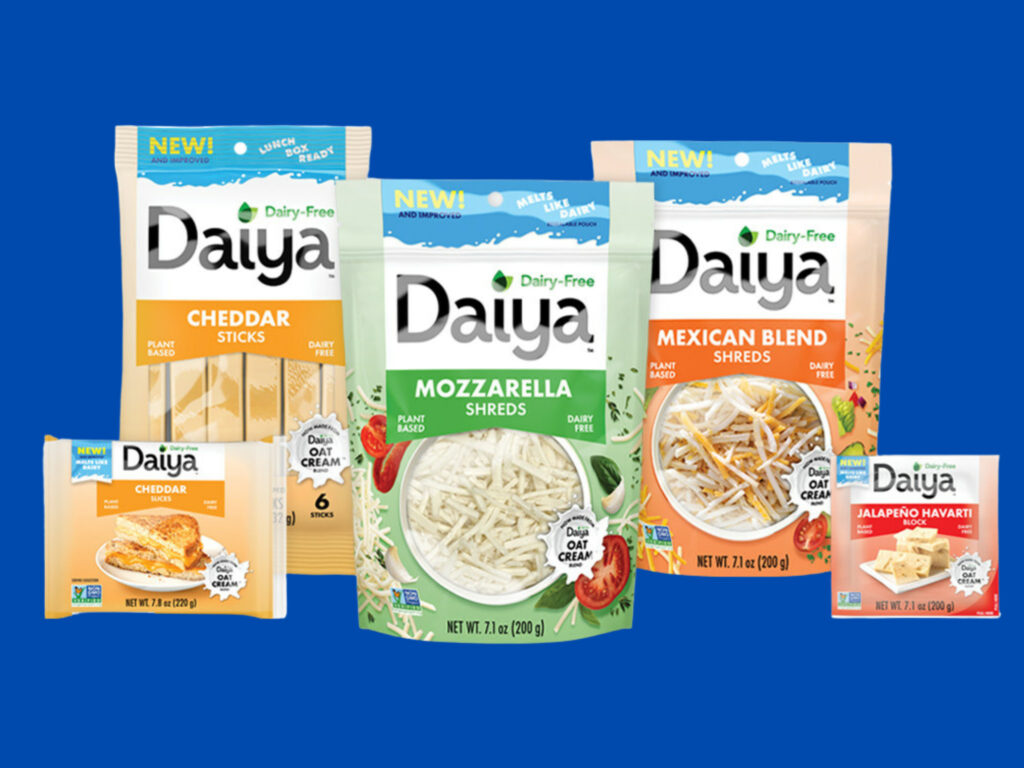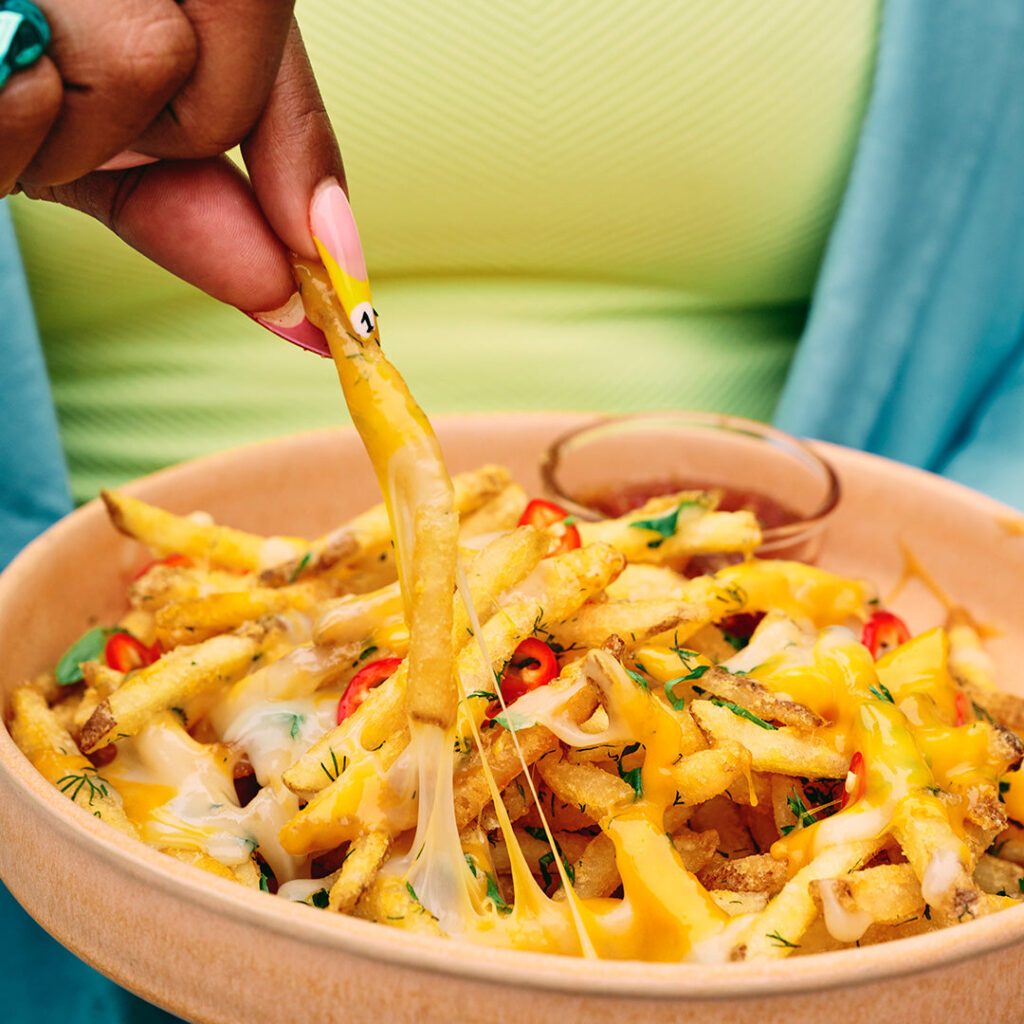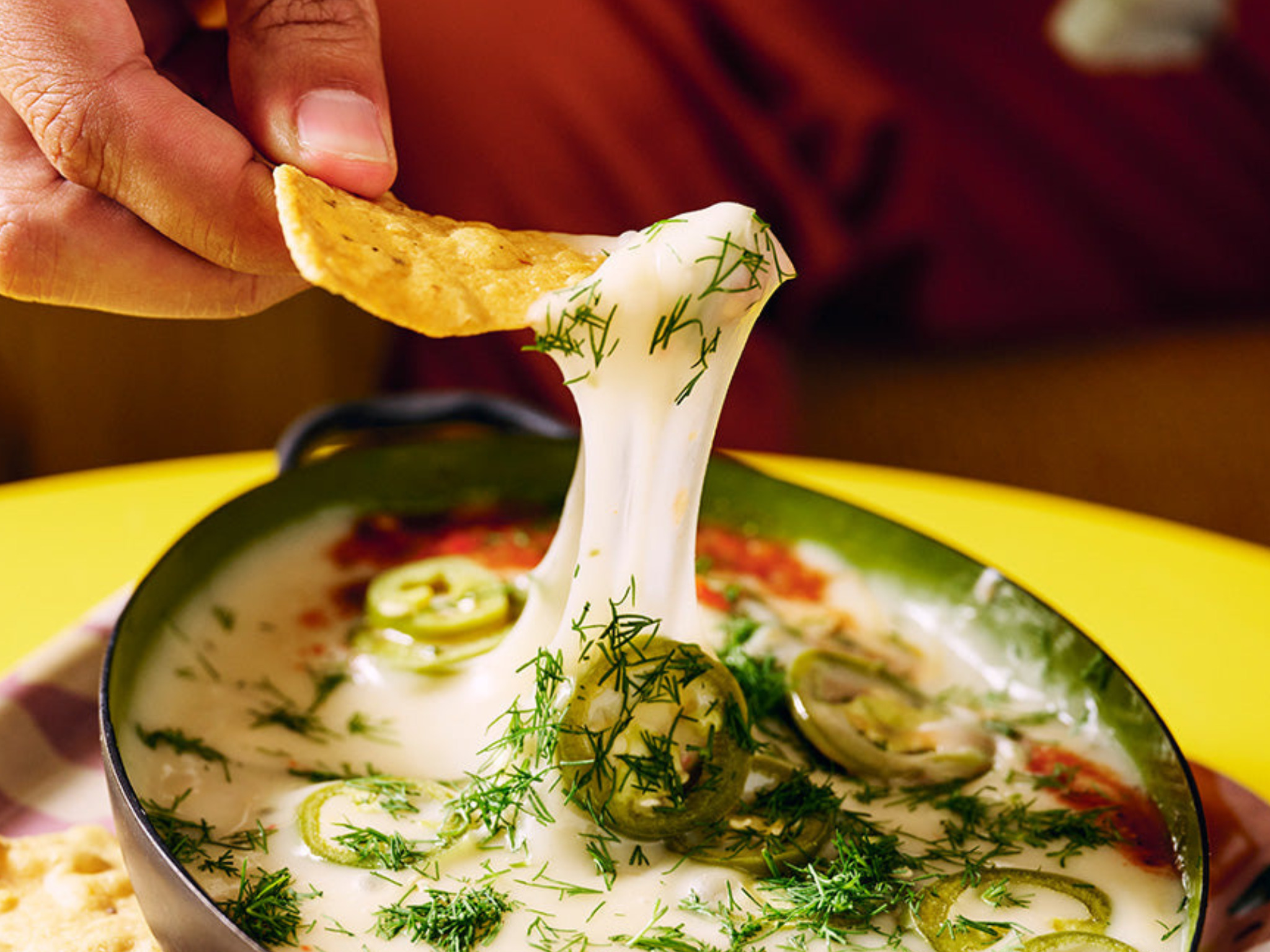5 Mins Read
Canadian brand Daiya has launched its updated vegan cheese lineup, made from a base of its oat cream and using age-old traditional fermentation techniques to mimic dairy cheese better.
Nine months after announcing a multi-million-dollar investment in fermentation technology, Canadian alt-dairy leader Daiya has launched its resultant product, a reformulated version of its vegan cheeses. The new offerings are made from the company’s oat cream blend, which replaces the chickpea protein base it used in the previous iterations of its cheeses. As part of the reformulation, Daiya has refreshed its logo and packaging.
The company has switched to a natural fermentation recipe to combine traditional cheesemaking techniques with modern tech, with its fermentation site housed in its British Columbia facility, which it claims is “the largest standalone plant-based facility of its kind in North America”.
The new cheeses – part of its expansive portfolio that features pizzas, mac and cheese, cream cheeses, cheesecakes, flatbreads and dressings – will replace the existing crop on the shelves of all the over 25,000 North American stores Daiya is stocked in, and at the same price.
Daiya turns back the clock for a creamier future

Daiya’s new cheeses are headlined by a base of fermented gluten-free oat cream, which comprises oat flour, water, pea protein, proprietary vegan cultures and enzymes. This is now a building block across its range of plant-best shreds, slices, blocks and sticks.
The company says the use of fermentation enables its cheeses to reach “dairy parity”, promising that they melt just like their conventional counterparts. Daiya adds that the new products are “creamier” than their predecessors, and “tastier, meltier, and stretchier than any other on the market”.
“We believe that the future of plant-based cheese achieving parity to dairy lies in traditional fermentation techniques,” former Daiya CEO Michael Watt had said when announcing the fermentation investment in March. “I don’t believe any brand has fully cracked the code on a formula that cheese lovers feel entirely confident in – Daiya is going to change that.” (Watt was replaced as CEO by Hajime Fujita, who was a VP at its parent company, Japan’s Otsuka Pharmaceuticals, last month.)
R&D director Jamie Siu added: “We’ve worked with experts to develop a facility and formulation that is world-class. For our team to be able to deliver this fermented product has been no small task. It has involved extensive research and development in the traditional art of cheesemaking, applied in a plant-based setting.”
At that time, the company had noted how it was trying to stand out from brands incorporating “GMO techniques such as precision fermentation” by investing in traditional fermentation for its dairy-free cheeses. While introducing its new cheeses, it has doubled down on this rhetoric: it references not just precision fermentation, but even producers that “continue to incorporate oil-based ingredients”, and how the brand itself is perfecting vegan cheesemaking “the natural way”.
It’s a curious statement to make, given that the 15-year-old cheesemaker’s reformulated recipe still has coconut oil listed as the second ingredient on all its cheeses, after the oat cream base. Other established brands making fermented vegan cheese in North America include fellow Canadian player Spread’em Kitchen Co., as well as US-based Miyoko’s Creamery and Vertage – proving that there is room for success with this approach.
Giving consumers what they want

“Our fermentation process can take anywhere from 10-20 hours before we age the product further to really capture that cheesy aroma,” Siu told VegNews in October. “While it now takes longer to produce our cheeses, this is all in pursuit of a much superior product.”
And there is scientific proof that fermentation can make for a superior dairy-free cheese. Danish scientists have found that fermenting yellow pea protein through bacteria can produce compounds normally found in dairy-based cheeses. Daiya’s use of pea protein alongside oats is a case in point, and separates it from the aforementioned challengers, which use a base of nuts.
“While there are a lot of people who would like to eat plant-based cheese, they aren’t satisfied with how it tastes and feels in the mouth,” said Carmen Masiá, the lead researcher behind this Danish project. “In the end, this means that no matter how sustainable, nutritious, etc. a food product is, people aren’t interested in buying it if it doesn’t provide a good experience when consumed.”
That point hits the nail on the head: Americans want better plant-based cheese. Despite recording $233M in dollar sales last year, vegan cheese saw a 2% drop in that figure year-over-year, with retail sales down by 5% too, according to SPINS data crunched by the Good Food Institute. With just a 1.1% share in the overall cheese category, dairy-free alternatives have only entered 5% of all US households, and only half of consumers who try them repeat their purchase.
And a study leveraging Kroger data from 60 million American households revealed that nearly three-quarters (73%) of Americans are unhappy with the flavour (which they describe as “plastic” or “unnatural”) and texture (“grainy”) of vegan cheese. They want cheeses that taste better, melt well and have a creamy texture – all attributes that Daiya has ascribed to its new oat-based lineup.
But it’s not just the recipe that’s been updated – the cheesemaker has also revamped its visual identity with a new logo and tagline and overhauled packaging. The refresh aims to appeal to a wider market beyond just vegan consumers, with the packs reading: “100% plant-based. Even if you’re not.” It’s a nod to the flexitarian market that is key to plant-based brands’ growth, and a shift away from what Daiya terms an “all or nothing” approach to veganism.
“We expect this advancement to not only rejuvenate consumer confidence in the category,” said chief commercial officer Melanie Domer, “but revitalise the category’s market potential, finally offering retailers a product that truly bridges the gap between consumer expectations and dairy-free offerings.”




